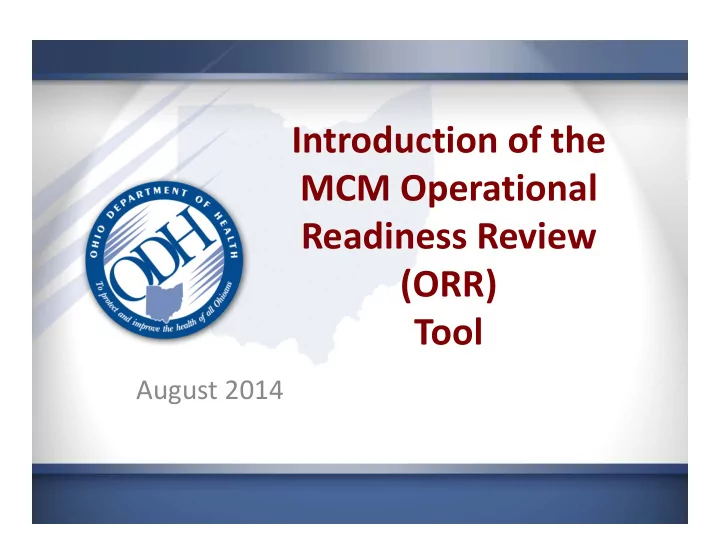

Introduction of the MCM Operational Readiness Review (ORR) Tool August 2014
OBJECTIVES Describe the new CRI review process Define CRI and MCM Discuss MCM ORR implementation plans
MCM Operational Readiness Review Tool New Cities Readiness Initiative (CRI) review process for Budget Period 3 (BP3) ‐ July 1, 2014 to June 30, 2015
Cities Readiness Initiative CDC's Cities Readiness Initiative (CRI) is a federally funded program designed to enhance preparedness in the nation's major metropolitan statistical areas (MSAs) where more than 57% of the U.S. population resides. Through CRI, state and large metropolitan public health departments have developed plans to quickly receive and distribute medicine and medical supplies from the Strategic National Stockpile (SNS) to local communities following a large ‐ scale public health emergency.
Medical Countermeasures Include both biologic and pharmaceutical medical countermeasures (e.g. vaccines, antimicrobials, and antibody preparations), non ‐ pharmaceutical medical countermeasures (e.g. ventilators, devices, personal protective equipment such as face masks and gloves), and public health interventions (e.g. contact and transmission interventions, social distancing, and community shielding) to prevent and mitigate the health effects of biological agents.
Purpose of the ORR Not only measures a jurisdiction’s ability to plan, but it will also examine its ability to execute a response requiring distribution and dispensing of medical countermeasures The ORR is designed to be scalable – one review tool is used for awardees and local jurisdictions.
Purpose of the ORR Focused on elements from eight Public Health Emergency Preparedness (PHEP) capabilities that are needed to execute a successful medical countermeasure response mission.
Purpose of the ORR Capability 1: Community Preparedness Capability 3: Emergency Operations Coordination Capability 4: Emergency Public Information & Warning Capability 6: Information Sharing Capability 8: Medical Countermeasure Dispensing Capability 9: Medical Materiel Management & Distribution Capability 14: Responder Safety & Health Capability 15: Volunteer Management
Levels of Implementation No numerical scoring as existed in the TAR Budget Period 3 MCM ORR data will be considered provisional and will not be tied to any benchmarks subject to funding penalties
Levels of Implementation ORR uses a continuum of levels of implementation – Early implementation – Intermediate implementation – Established implementation – Advanced implementation CDC does not expect jurisdictions to be at an advanced planning or operational level for all tasks
Levels of Implementation Early Implementation – Jurisdiction demonstrates the beginning stage of planning or operations Intermediate Implementation – Jurisdiction demonstrates planning or operations that have progressed beyond the beginning stage, but may lack some criteria deemed important in response to an MCM incident
Levels of Implementation Established Implementation – Jurisdiction demonstrates planning or operations criteria that meet the capability standard Advanced Implementation – Jurisdiction demonstrates planning or operations that exceed or enhance the capability standard
Levels of Implementation For each task in the MCM ORR, the four levels of implementation are defined by specific criteria
MCM Operational Readiness Review Tool In BP3, CDC will use the new Medical Countermeasure (MCM) Operational Readiness Review (ORR) tool to review the state of Ohio and the cities of Cincinnati, Cleveland and Columbus
Jurisdictional Data Sheet In BP3, CDC will require all awardees and local CRI jurisdictions to provide basic dispensing and distribution data. – Formerly know as the Baseline Data Sheet as part of the TAR. Administered as part of ORR for awardees and participating CRI jurisdictions – ODH, Cincinnati, Cleveland and Columbus Administered via Excel form for remaining CRI jurisdictions
Questions
Recommend
More recommend